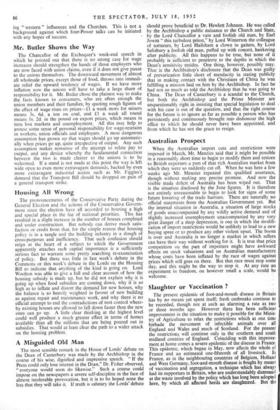Mr. Butler Shows the Way
The Chancellor of the Exchequer's week-end speech in which he pointed out that there is no strong case for wage increases should strengthen the hands of those employers who are now faced with union claims, even if it does not give pause to the unions themselves. The downward movement of almost all wholesale prices, except those of food, throws into immedi- ate relief the upward tendency of wages. If we have More inflation now the unions will have to take a large share of responsibility for it. Mr. Butler chose the plainest way to make the facts known to consumers, who are often enough the union members and their families, by quoting rough figures of the effect of wage rises on prices—£1 a week more for miners means 3s. 6d. a ton on coal, and £1 a week all round means is. 2d. in the pound on export prices, which means in turn lost markets and unemployment. All this may help to arouse some sense of personal responsibility for wage-restraint in workers, union officials and employers. A most dangerous assumption has grown up that wages should go up automatic- ally when prices go up, quite irrespective of output. Any such assumption makes nonsense of the attempt to relate pay to output, and any device whereby the fundamental connection between the two is made clearer to the unions is to be welcomed. If a stand is not made at this point the way is left wide open to even more .extravagant demands, backed by even more extravagant industrial action such as Mr. Figgins's demand that the Transport Bill should be dropped on pain of a general transport strike.


































 Previous page
Previous page